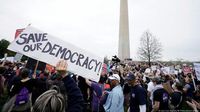Mass protests erupted across the United States on April 5, 2025, against President Donald Trump and Tesla CEO Elon Musk, marking the largest demonstrations since Trump’s re-election. Under the banner "Hands Off!", protests took place in all 50 states, organized by over 150 groups including civil rights organizations, labor unions, and LGBTQ+ advocates.
According to reports from the Associated Press, Reuters, and CNN, approximately 600,000 people participated in around 1,400 rallies nationwide. The demonstrations were largely peaceful, with no significant incidents of violence or arrests reported. Protesters voiced their discontent over a range of issues, including the administration's plans to cut federal funding for social programs and the deportation of immigrants.
In Washington, D.C., thousands gathered at the National Mall, where members of Congress, including Democratic Reps. Jamie Raskin and Ilhan Omar, addressed the crowd. Raskin drew a comparison between Trump’s presidency and the regime of Italian dictator Benito Mussolini, stating, "In America, justice is not for sale, and we do not auction off Supreme Court judges for million-dollar prizes." Protesters held signs that read, "Not my president!" and "Stop evil," expressing their frustration with the current administration.
Similar scenes unfolded in cities from New York to Los Angeles, where demonstrators chanted slogans like "Power to the people" and carried placards proclaiming, "Hands off education!" In Boston, Mayor Michelle Wu joined the protests, condemning Trump’s tactics as an attack on diversity and equality.
Hundreds also gathered in Palm Beach, Florida, near Trump’s Mar-a-Lago residence, where he was playing golf at the time. Protesters there called for a halt to policies they believe threaten the very fabric of American democracy.
In a statement, the White House responded to the protests by asserting that Trump remains committed to protecting social security, Medicare, and Medicaid for eligible citizens. The administration criticized Democrats for allegedly seeking to extend these benefits to undocumented immigrants, claiming it would jeopardize the programs.
Protests were not limited to the U.S.; similar demonstrations occurred internationally in cities like London, Paris, and Berlin. Protesters abroad echoed sentiments of dissatisfaction with Trump’s foreign policy, particularly regarding global tariffs, which they argue have negatively impacted economies worldwide.
As the protests unfolded, Trump took to his social media platform, Truth Social, warning Americans of difficult changes ahead due to ongoing trade wars. He claimed that China has suffered more than the U.S. and urged patience, stating, "This will not be easy, but the end result will be historic." His approval ratings have reportedly dipped to 43%, the lowest since he took office.
The demonstrations were seen as a critical moment for the opposition movement, which is attempting to regroup after the initial shock of Trump’s return to power. Activists have vowed to continue their peaceful dissent against an administration they believe does not represent the interests of the American people.
Experts suggest that these protests could be a precursor to larger-scale actions in the future. Vladimir Vasilyev, a chief researcher at ISKRAN, noted that the political climate is shifting, with increased public activism expected as tensions rise between different political factions.
In the wake of the protests, many are questioning the implications of Musk’s significant role in the government through the newly established Department of Government Efficiency (DOGE), which aims to reduce federal spending. Critics argue that Musk's influence as a naturalized citizen in government roles raises ethical concerns.
The protests on April 5 were not isolated incidents but part of a broader pattern of public dissent against Trump and Musk’s policies since the former’s re-election. As activists continue to mobilize, they hope to exert pressure on the administration to reconsider its approaches to governance, particularly regarding social justice and economic equity.
According to reports, the protests are a reflection of widespread dissatisfaction with the current trajectory of U.S. politics, as citizens from various backgrounds unite to advocate for their rights and the preservation of democratic values.
As the political landscape continues to evolve, the voices of those protesting against Trump and Musk represent a significant segment of the American populace that is determined to hold their leaders accountable.









